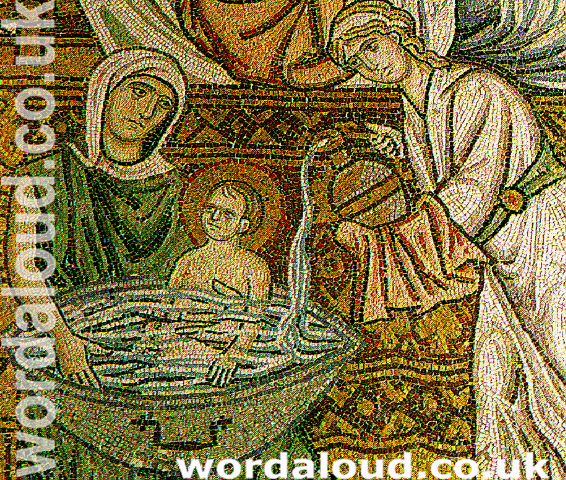Christian Art | Jesus Rebukes Satan
Luke 11: 14-23 – Lent Week 3, Thursday (Audio Bible, Spoken Word)
14 ¶ And he was casting out a devil, and it was dumb. And it came to pass, when the devil was gone out, the dumb spake; and the people wondered.
15 But some of them said, He casteth out devils through Beelzebub the chief of the devils.
16 And others, tempting him, sought of him a sign from heaven.
17 But he, knowing their thoughts, said unto them, Every kingdom divided against itself is brought to desolation; and a house divided against a house falleth.
18 If Satan also be divided against himself, how shall his kingdom stand? because ye say that I cast out devils through Beelzebub.
19 And if I by Beelzebub cast out devils, by whom do your sons cast them out? therefore shall they be your judges.
20 But if I with the finger of God cast out devils, no doubt the kingdom of God is come upon you.
21 When a strong man armed keepeth his palace, his goods are in peace:
22 But when a stronger than he shall come upon him, and overcome him, he taketh from him all his armour wherein he trusted, and divideth his spoils.
23 He that is not with me is against me: and he that gathereth not with me scattereth.
Jesus has performed miracles and his redeeming power over the devils which possess people is clearly apparent; Jesus’ power over evil is manifest. The people marvel, and yet their hearts are hardened to the truth of Jesus. Rather than see with their eyes and understand, they reject the truth of Christ. They retreat to within the evil that holds them captive, which prevents them from seeing the truth of Jesus. They mutter and grumble and gossip, actively seeking to suggest the worst possible and false interpretation of what they have witnessed. They have seen the work of absolute good. They choose to accuse this good of being evil. They do not rise to the message of Christ.
Jesus sees how the minds of the people are closed and he challenges them. He tells the people that a house divided against itself cannot stand. Evil will consume itself. Evil is an entirely destructive force that will inevitably bring about its own destruction. In order to understand this moment of Christ’s life on earth, we should remember that Christ is only doing good, and yet those who witness his good works are so dedicated to evil that they seek to interpret what they see in Christ’s actions as being evil. This is utterly false, and this tells us much about the predicament of the people whom Christ wishes to save.
Jesus goes on to describe Satan as a strong man, fully armed, guarding his house. The people are Satan’s captives. Christ is the stronger one, come to defeat Satan and take away from Satan those who believe in Jesus and see Jesus truthfully as what he really is, their salvation.
We are called to unity in our faith in Jesus. We are called to see beyond prison walls and to recognize our Saviour. We are called to be with Christ and to help every other human on earth to understand the redemption Christ brings to us.
The devil has no power over us when we approach Christ’s teachings with an open and honest mind. Through hearing and obeying Christ’s message, the prison walls of Satan’s evil are made nothing.
‘In the past prayer brought plagues, put to flight the hosts of the enemy, brought on drought. Now, however, the prayer of righteousness turns aside the whole wrath of God, is concerned for enemies, makes supplication for persecutors. Is it surprising that it knows how to squeeze out the waters of heaven, seeing it did have power even to ask for fire and obtain it? Prayer alone it is that conquers God. But it was Christ’s wish for it to work no evil: he has conferred upon it all power concerning good.’ Tertullian
![]()

Audio Bible KJV | Endnotes
Jesus The Exorcist | Casting Out Of Devils In The Bible
In Luke 11:14-23, Jesus is depicted as an exorcist who casts out a devil from a man who was mute. This miracle leads to a discussion about the power of Jesus and his relationship with the devil. Jesus explains that he is able to cast out devils because he is Godly, empowered by the Spirit of God, and that this is a sign of the coming of the Kingdom of God.
The casting out of devils was a common practice in the time of Jesus. It could be seen as a sign of the power of God at work, though there was belief in the time of Jesus that evil spirits could only be cast out by other evil spirits.
Christians believe in the reality of Satan and demons, and some priests specialize in exorcism. However, our understanding of illness and disability has changed over time, and we no longer attribute these conditions to demonic possession.
Nevertheless, this account of the exorcism guides us yet towards Jesus and to the Kingdom. It reminds us of the power of Jesus over evil and of the importance of recognizing the presence of God’s Spirit at work in the world. It also reminds us that the coming of the Kingdom of God is not just a future event, but is something that can be experienced in the present through the power of the Spirit.
Through the season of Lent, we may reflect on ways in which we may be held captive by the power of sin and evil in our lives, and we may look to Jesus as the one who has the power to set us free. We also seek to be filled with the Spirit of God, so that we may be empowered to live in a way that reflects the values of the Kingdom of God.
Jesus warns that those who speak against the Holy Spirit are in danger of committing an unforgivable sin. The ultimatum ‘he that is not with me is against me’ makes it clear that there is no neutral ground when it comes to Jesus’ ministry and message. Jesus explains that he is the gateway to salvation, and that there is no in-between; the commitment must be made.
There is to be a positive choice to conversion – to this revolution in terms of our understandings of life and death, good and evil, heaven and hell. We do not passively wander into heaven. There is to be a change of heart to be with Jesus.








